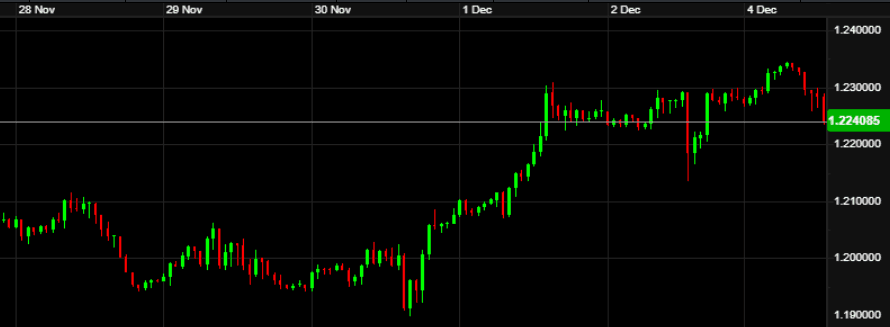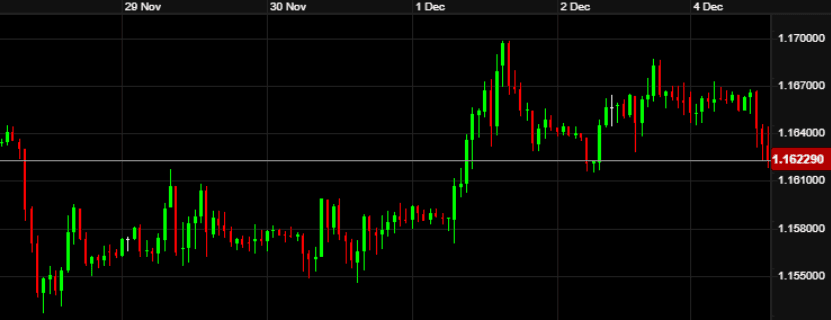ACM Update 05-12-22

Most of the heavy hitting numbers came from the US last week, creating further volatility for GBP-USD. By close on Thursday the pair had tipped over 10% worth of movement in less than four weeks. With little significant market data this week, attention is likely to switch to the latest Federal Reserve, ECB and Bank of England meetings, all in the space of 24 hours on 14th & 15th December.
America was the main focal point last week as Wednesday’s preliminary US GDP came in above expectation at 2.9%, sending rates under 1.19. But within 24 hours we were back 4 cents in the opposite direction. Federal Reserve Chair Jay Powell’s speech on Wednesday evening hinting the Fed will start to slow their rate hikes in the upcoming December meeting was a major factor, with the Dollar sell off continuing in Asian trading on Thursday morning.
The US PCE Inflation Index slowed by more than expected on Thursday, reinforcing Powell’s policy stance and bouncing the Dollar over 1.23. All eyes were then on the Non-Farm Payrolls come Friday, which beat estimates with a figure of 263k jobs added, versus 200k forecast. The Dollar regained circa 1% versus its peers, before reversing back over 1.23 again by the European close.
As mentioned, next week’s Federal Reserve meeting on Wednesday is key for Dollar-focused clients. The Federal Reserve are likely to be slowing down their rate hikes as a result of recent movements in inflation numbers. A rise of half a per cent seems likely, but anything outside of this could see substantial movement. Make sure to reach out to the team to avoid the potential of any further swings against you.
Movements last week on GBP-USD can be seen in the chart below, with the weekly high being the highest rate since 27th June 2022:

Besides the football on Sunday evening, there wasn’t a huge amount of positive data out of the UK last week. This further demonstrates the “all eyes on the Fed” market approach at the minute.
UK mortgage approvals in October were down at 59,000 which is their lowest figure since July 2020 and demonstrates the chaos in the mortgage market caused by “Trussenomics”. Net lending figures for individuals also recorded their lowest figure in 12 months in the same period, with Nationwide recording a drop in UK house prices of 1.4% for November.
Sterling-Euro touched its highest rate since 30th August last week, as demonstrated in the chart below:

In the Eurozone, Christine Lagarde used a speech at a Bank of Thailand conference to maintain that monetary policy remains “complicated” for the ECB. She cited the state of the global economy and inflation developments as her main concerns. On which note…. The flash estimate of CPI was released for November and suggested a figure of 10.0% which would be music to the ears of those in Frankfurt, but feels a bit optimistic. That said, the German preliminary inflation figure for November suggests a drop of 0.5% month on month.
In Australia, inflation came down to 6.9% in November’s YoY figure, from 7.3% last month. Just in time for figures to drop, the RBA have now been able to get monthly inflation data like the rest of the world.
The week ahead:
Monday – Eurozone Retail Sales (Released @ -1.8%, 10:00 UK time)
Tuesday – Reserve Bank of Australia interest rate announcement (exp +25bp, 03:30), UK Construction PMI (09:30)
Wednesday – Halifax House Price Index (07:00), Bank of Canada rate announcement (exp +25bp, 15:00)
Thursday – US Unemployment Claims (13:30), Italian Bank Holiday
Friday – US Producer Price Index (13:30)
Little data of note this week from the UK, with Halifax house price data for November the only real piece of significance. Naturally this is expected to show a slight drop on the previous month (which itself was a slight drop also).
Eurozone Retail Sales have been released this morning showing a drop of -1.8%, further signs of a slowdown on the continent in October.
For the US, unemployment and Producer Price Index (producer inflation) will be the main releases of note. These are likely to continue to support the ongoing Federal Reserve monetary policy.
Central bank meetings in Australia and Canada are both likely to demonstrate rate hikes of 25 basis points. This is an ongoing indication of how these central banks now feel they are reaching the peak on inflation, having gone aggressive with policy stance earlier in the year.
So a quieter week ahead is possibly a likelihood. Next week we hear from the following major central banks:
Federal Reserve – Wednesday 14th December @ 19:00 (exp 0.5% hike)
Bank of England – Thursday 15th December @ 12:00 (exp 0.5% hike)
European Central Bank – Thursday 15th December @ 13:15 (exp at least 0.5% hike)
Whilst things may be quiet this week, next week is unlikely to be that way. Make sure to get in touch regarding any upcoming requirements, to understand how we can help remove your foreign exchange risk.
Have a great week.